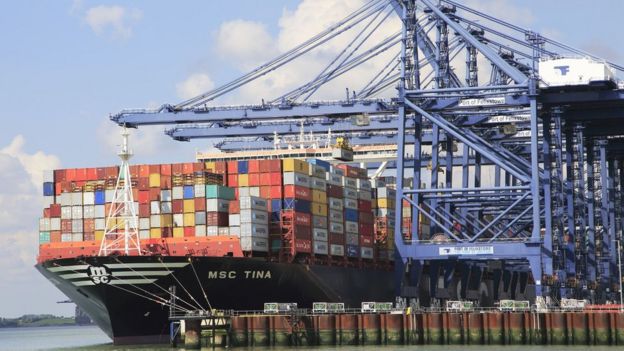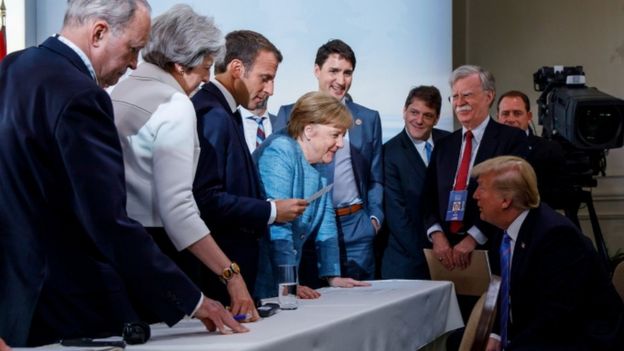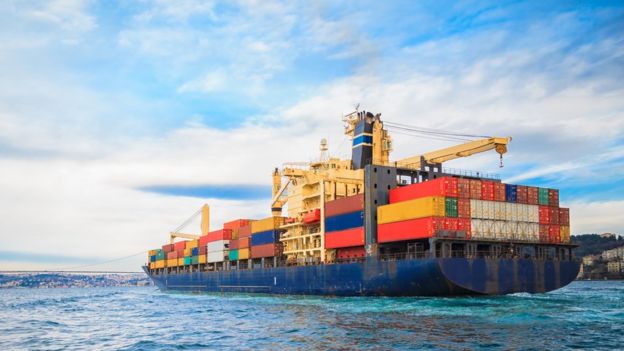With An Ignorant President You Have the G7 Allies Getting Trump's Insults
 GETTY IMAGES
GETTY IMAGES- Business lobbies are growing more concerned at the prospect of Brexit putting expensive, time-consuming barriers in the way of trade
- The opening salvos in Donald Trump's trade war are already raising prices for American manufacturers and consumers.
- Why do we trade? Maybe we've taken it for granted, and need a refresher course in why it works for all sides - though for all groups within countries, and that's why pressure on trade has been rising.
- Scotland is being challenged to be more deliberate and strategic in growing exports, at a time when the international outlook is getting more complex.
Perhaps we take it for granted. Few of us realise how much it shapes our lives. But trade has rarely been such a focus of attention, and rarely has it been under so much threat.
The prospect and growing chances of a hard Brexit is focussing the minds of business, and particularly in Britain.
The UK government has gone out of its way in recent days to be seen to be listening to the business lobby. But when they do, the warnings are getting louder and starker.
From the CBI at week's end, there was another warning about Brexit uncertainty. With the weakened pound and strong demand from overseas, this ought to be a good time for a rebalancing towards more exporting, it says.
Yet the mood at home is of hesitancy and uncertainty. The employers' organisation says government needs to offer more clarity and signs of progress on the road to Brexit, or else business will hold back on investment.
Playing chicken
A forceful message came earlier in the week from hauliers - the people who will be on the front line if a customs curtain comes down at Dover and numerous other ports.
James Hookham, deputy chief executive of the Freight Transport Association, said it made eight requirements of government at the start of the year, and none of them has made any progress since then.
He points to a lack of place or system to check goods at the border. One in eight UK truck drivers is a non-UK national, so it's not clear what their status will be, or whether UK drivers will have their qualifications recognised on the other side of the channel.
And he says there are only 103 international haulage permits to go round 300,000 overseas trips by UK trucks each year.
If you didn't see his comments, it's worth getting a sense of the anger and frustration, which Mr Hookham says is building daily. "Logistics businesses simply cannot answer their customers' questions about how they will move goods after Brexit. Manufacturers and retailers are losing faith and fear that post-Brexit Britain is at real risk of becoming nothing more than a series of road blocks at our ports and airports.
"What is really making our members angry is that these real, legitimate concerns are simply being dismissed by some members of the Government on the basis that it will not be in the EU's interests to impose them. This is a reckless attitude to take and is playing chicken with crucial parts of the British economy and the livelihoods of the seven million Britons in the industry." In Brussels over the past week, I heard a similar - though more diplomatic - message from the American Chambers of Commerce in the EU. Its director, Susan Danger, was citing figures for delays at European borders.
A truck carrying goods certified from within the single market takes an average two minutes to process, she said. Coming from outside the EU, for instance from Turkey, takes between 20 and 90 minutes.
The US Chambers reckon that a small increase from two to only four minutes average processing time between Dover and Calais would mean a 25 kilometre build-up of waiting traffic.
And that's apart from the tariffs that could be imposed if there's a default to the levels compatible with World Trade Organisation rules.
One member of the organisation, Mars, moves ingredients and finished products across numerous borders to and from numerous plants and customers. It is looking at the possibility of a 30% tariff on confectionary and 15% on grains.
If not absorbed by companies, that extra cost falls on customers.
Protective wall
If you want to learn more about the impact of tariffs, have a chat with steel importers in the United States. The imposition of 25% import tariffs by the Trump administration has had a powerful impact already, and that was before it was extended to Canada, Mexico and the European Union.
According to market analysts Jefferies, total imports of steel to the US last month were down 21% on April and 15% on May 2017. Unfinished steel was down 32% month-on-month, and 31% year-on-year. The reason seems clear. Companies were cancelling orders as tariffs were imposed and uncertainty about future trade policy soared.
The immediate result is that US producers have firmed up the prices they charge to US manufacturers for whom steel is an input. They, in turn, raise prices to end consumers. One economic study in the US reckons that half of the advantage to families of the recent tax cut will be lost by higher prices due to these trade measures.
Why? The effect of tariffs is to put a domestic industry behind a protective wall. That allows them to maintain or increase inefficiency.
They may, meantime, rise to the opportunity to grab market share by investing in new steel-making capacity.
"The administration's goal is ostensibly to boost domestic production/employment," Jefferies said in its analysts' note.
"But, who really thinks that the US will continue to levy tariffs against three of its most important allies? We don't. And likely, neither do mills. The lack of visibility supporting current policy is likely to delay US capacity growth, which is reliant on policy longevity well beyond the Trump administration."
Mutually beneficial
 REUTERS
REUTERS
Donald Trump took his battle for better trade terms to the G7 summit in Canada. He Tweeted his intentions in advance: "Getting ready to go to the G-7 in Canada to fight for our country on Trade (we have the worst trade deals ever made)".
France's President Macron, not that long after his Washington bromance, responded that if the US is going to treat the G7 that way, the other six would make their own agreements.
The talks between these long-time allies, we're told, were fractious. After strenuous efforts to find consensus, they appeared to agree to support "free, fair and mutually beneficial trade", based on a "rules-based system".
But then, having left early and taking offence at comments made by Canada's prime minister as the other six government leaders wound up their summit, Donald Trump instructed his officials not to sign up to the deal.
As with so much of what he does and says, the American president was communicating with his voter base. The Economist magazine this week caricatured his trading policy as if Miley Cyrus astride a wrecking ball.
But it was a communication that will be heard in every other forum, possibly making it more difficult for Mr Trump to strike other deals with other governments and people, if they think he will repudiate them while on the plane home.
Why trade?
All this should force us to take a longer, harder look at why we trade. Why not look after our own first, and ensure that we maintain our own industries, including digging coal and making steel?
Between Adam Smith and David Ricardo, more than 200 years ago, the very strong economic orthodoxy is that trade - between countries, between regions and, from way back in history, between towns and burghs - makes trading partners better off.
That's even if one of the partners is more efficient at producing goods and services. Trade pushes trading partners into focussing their efforts where they have a comparative advantage.
 GETTY IMAGES
GETTY IMAGES
Tariffs were once the primary source of revenue for governments. They allowed industries to be built up, protected from overseas competition. But over time, that means the industries can operate inefficiently and as a result, consumers will pay more than they would otherwise pay, for often inferior goods.
Removing them has been a long haul. It has been one of the strongest economic movements of the post-1945 era, fuelled by the searingly painful experience of America's retreat into protectionism in the 1930s.
There's still a lot further to go. Progress towards that has slowed, not least because the more intransigent barriers to trade are in non-tariff barriers - around the regulation of goods and services, and the way in which countries insist distribution and sales operate.
The catch, though, is that generalisation that all sides benefit from trade, just as all sides lose out by a contraction of trade. That's not true if you look into a country as it is opened up to trade, and in recent years to globalisation.
Internally, there are winners and losers from more open trade. And the Trump Presidency is one manifestation of the backlash from those who have lost out - the steel-workers and coal-miners he has promised to protect and return to their glory days.
It was a similar coalition of the left-behind-by-globalisation who took the Leave campaign to victory in the Brexit campaign - resentful that the opening of barriers was not only shifting jobs to cheaper foreign locations, but allowing more foreigners in to compete for jobs.
The leaders at the G7 summit have challenges of that type within their countries. Much of government leadership, it is becoming clear, is about how to resolve the tensions between winners and losers from trade. Much of populism is about exploiting those tensions and building fear around them.
Smaller and deliberate
In Scotland, at least, there's been some better trade news in the past week. The first quarter of the year saw a 12% rise in the exports of goods from Scotland, according to HMRC figures. That may reflect a partial recovery from the oil and gas sector slump.
However, a report by Professor David Skilling, published by the Reform Scotland think tank, has some clear messages about the need to to raise Scotland's game, if it is to match his comparable group of small advanced nations.
This is the full report which helped inform the Sustainable Growth Commission led by Andrew Wilson, which reported to the SNP.
Small advanced economies are, notes the professor, more vulnerable to shocks from changes in the trading environment. But they are also better placed to pick up on the advantages.
They have benefited most of all from the liberalisation of trade as it picked up pace in the past 30 years or so, meaning scale was no longer necessary to maximise a country's potential. That was especially clear for those participating in Europe's single market. Looking at similar-sized countries, what Prof Skilling found was vital to driving their growth in exports was a "deliberateness", or what he calls a "strategic coherence" - not trying to do everything, but doing a few things very well.
This was reflected in Andrew Wilson's report, and much of it applies as much to Scotland within the UK as it would to Scotland if it were independent.
The implication is that it may not be enough to exhort companies to export, and then to export more. Small countries have succeeded by choosing where to make most effort, focussing on their strengths.
Paradoxically, one concern about Scotland's trading position is that it is currently has too few companies dominating, across whisky, salmon and oil and gas.
After three decades of a benign environment of this, Prof Skilling notes that the outlook features growing challenges for small advanced nations - notably a "growing intensity of global competition" and a more complex and challenging international economic and political environment.
With rancour among allies in Quebec this weekend, and the Whitehall Cabinet unclear what kind of trading relationship it wants with the outside world, that environment seems to be getting more complex and challenging by the day.
Comments